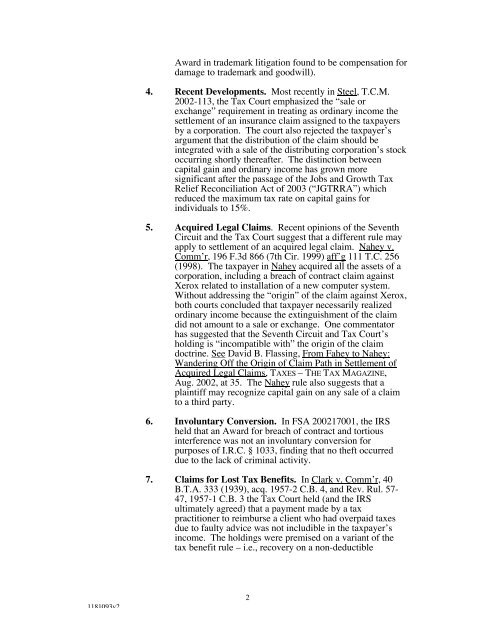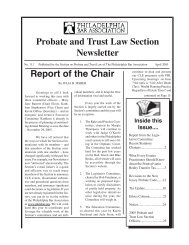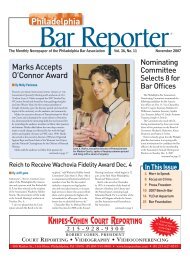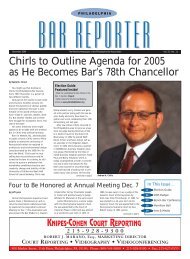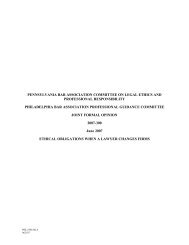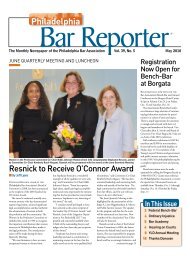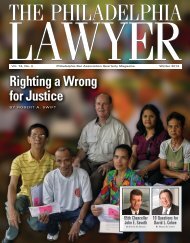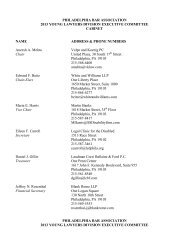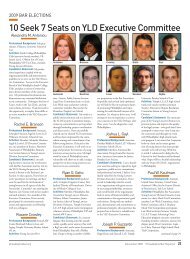Tax Aspects of Litigation Awards and Settlements - Philadelphia Bar ...
Tax Aspects of Litigation Awards and Settlements - Philadelphia Bar ...
Tax Aspects of Litigation Awards and Settlements - Philadelphia Bar ...
You also want an ePaper? Increase the reach of your titles
YUMPU automatically turns print PDFs into web optimized ePapers that Google loves.
Award in trademark litigation found to be compensation for<br />
damage to trademark <strong>and</strong> goodwill).<br />
4. Recent Developments. Most recently in Steel, T.C.M.<br />
2002-113, the <strong>Tax</strong> Court emphasized the “sale or<br />
exchange” requirement in treating as ordinary income the<br />
settlement <strong>of</strong> an insurance claim assigned to the taxpayers<br />
by a corporation. The court also rejected the taxpayer’s<br />
argument that the distribution <strong>of</strong> the claim should be<br />
integrated with a sale <strong>of</strong> the distributing corporation’s stock<br />
occurring shortly thereafter. The distinction between<br />
capital gain <strong>and</strong> ordinary income has grown more<br />
significant after the passage <strong>of</strong> the Jobs <strong>and</strong> Growth <strong>Tax</strong><br />
Relief Reconciliation Act <strong>of</strong> 2003 (“JGTRRA”) which<br />
reduced the maximum tax rate on capital gains for<br />
individuals to 15%.<br />
5. Acquired Legal Claims. Recent opinions <strong>of</strong> the Seventh<br />
Circuit <strong>and</strong> the <strong>Tax</strong> Court suggest that a different rule may<br />
apply to settlement <strong>of</strong> an acquired legal claim. Nahey v.<br />
Comm’r, 196 F.3d 866 (7th Cir. 1999) aff’g 111 T.C. 256<br />
(1998). The taxpayer in Nahey acquired all the assets <strong>of</strong> a<br />
corporation, including a breach <strong>of</strong> contract claim against<br />
Xerox related to installation <strong>of</strong> a new computer system.<br />
Without addressing the “origin” <strong>of</strong> the claim against Xerox,<br />
both courts concluded that taxpayer necessarily realized<br />
ordinary income because the extinguishment <strong>of</strong> the claim<br />
did not amount to a sale or exchange. One commentator<br />
has suggested that the Seventh Circuit <strong>and</strong> <strong>Tax</strong> Court’s<br />
holding is “incompatible with” the origin <strong>of</strong> the claim<br />
doctrine. See David B. Flassing, From Fahey to Nahey:<br />
W<strong>and</strong>ering Off the Origin <strong>of</strong> Claim Path in Settlement <strong>of</strong><br />
Acquired Legal Claims, TAXES – THE TAX MAGAZINE,<br />
Aug. 2002, at 35. The Nahey rule also suggests that a<br />
plaintiff may recognize capital gain on any sale <strong>of</strong> a claim<br />
to a third party.<br />
6. Involuntary Conversion. In FSA 200217001, the IRS<br />
held that an Award for breach <strong>of</strong> contract <strong>and</strong> tortious<br />
interference was not an involuntary conversion for<br />
purposes <strong>of</strong> I.R.C. § 1033, finding that no theft occurred<br />
due to the lack <strong>of</strong> criminal activity.<br />
7. Claims for Lost <strong>Tax</strong> Benefits. In Clark v. Comm’r, 40<br />
B.T.A. 333 (1939), acq. 1957-2 C.B. 4, <strong>and</strong> Rev. Rul. 57-<br />
47, 1957-1 C.B. 3 the <strong>Tax</strong> Court held (<strong>and</strong> the IRS<br />
ultimately agreed) that a payment made by a tax<br />
practitioner to reimburse a client who had overpaid taxes<br />
due to faulty advice was not includible in the taxpayer’s<br />
income. The holdings were premised on a variant <strong>of</strong> the<br />
tax benefit rule – i.e., recovery on a non-deductible<br />
1181093v2<br />
2


